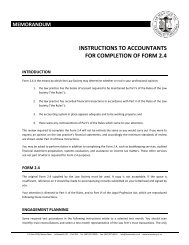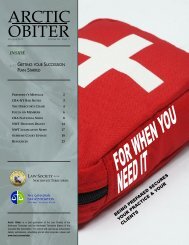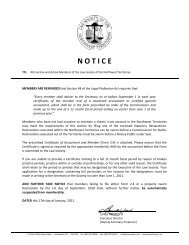ARCTIC OBITER
March/April 2013 - Law Society of the Northwest Territories
March/April 2013 - Law Society of the Northwest Territories
- No tags were found...
You also want an ePaper? Increase the reach of your titles
YUMPU automatically turns print PDFs into web optimized ePapers that Google loves.
And then there’s the plan. Again, the NWT followed<br />
Alberta with the idea that education must have<br />
intention and direction to be beneficial. So, we ask for<br />
an outline of the member’s areas of practice, interests<br />
in practice management, goals and objectives, and the<br />
learning tools they plan to utilize.<br />
Does it work?<br />
If national or international studies have returned<br />
inconclusive on the effectiveness of mandatory CPD,<br />
this small Law Society will certainly not have any<br />
conclusions either. However, the Law Society now has<br />
documentation on each active member that itemizes<br />
past educational activities and future plans for<br />
continuing education.<br />
It’s a record that the Law<br />
Society never had before, and one that comes in handy<br />
when assessing the competencies of each member.<br />
Tongue-in-cheek, at the very basic level, as seen in the<br />
past two years, the ability to correctly complete the<br />
required form is a measure of competency of its own –<br />
and often very useful in flagging concerning<br />
behaviours.<br />
Inspired by Jordan’s hypothetical conversation with a<br />
legislator, I imagined a simplified alternate in which<br />
mandatory CPD did not exist:<br />
Legislator: “What steps do you take to ensure<br />
successful applicants, once admitted to the Bar<br />
as lawyers and members under your<br />
governance, uphold the expected standards of<br />
competence?”<br />
Regulator: “None.”<br />
adapted to legislation, statutes, case law and<br />
the needs of the general public that have<br />
changed repeatedly during their tenure?”<br />
Regulator: “Nothing.”<br />
Here lies the true problem. It is not whether or not<br />
mandatory CPD works to accurately measure the<br />
competencies of its members.<br />
Rather, it is the<br />
necessity to have a system in place that proactively<br />
enforces the need for lawyers to continually learn, and<br />
in a way that leaves a heightened sense of public trust<br />
in our governance.<br />
The ultimate goal of any action by the Law Society is<br />
to secure public confidence and minimize avoidable<br />
damage to the public’s image of the profession. In this<br />
Law Society, the minimum CPD requirements are a<br />
means to prove we’ve asked for something from our<br />
members regarding continued competency. The onus<br />
has always been on the member to continually refresh<br />
their individual lawyering skills and knowledgebase,<br />
and this will not change because of mandatory CPD<br />
requirements. However, the standards put in place do<br />
provide the Law Society with the insight it needs to,<br />
for now, satisfy the expectations of the public.<br />
Jordan asks a very important question in his article,<br />
and his arguments are very valid and worth<br />
reviewing. But, the easy answer from this side of the<br />
regulation is that we’ve put something in place that,<br />
although it is not perfect, exists where nothing existed<br />
before. And, for now, it works for the purposes we<br />
intended.<br />
Legislator: “So what, if anything, can you<br />
provide to prove to the public that a lawyer, 30<br />
years after their admittance to your Bar, has<br />
not only retained the levels of competence<br />
measured at their time of call, but has also<br />
<strong>ARCTIC</strong> <strong>OBITER</strong> MARCH/APRIL 2013 ■ 21
















